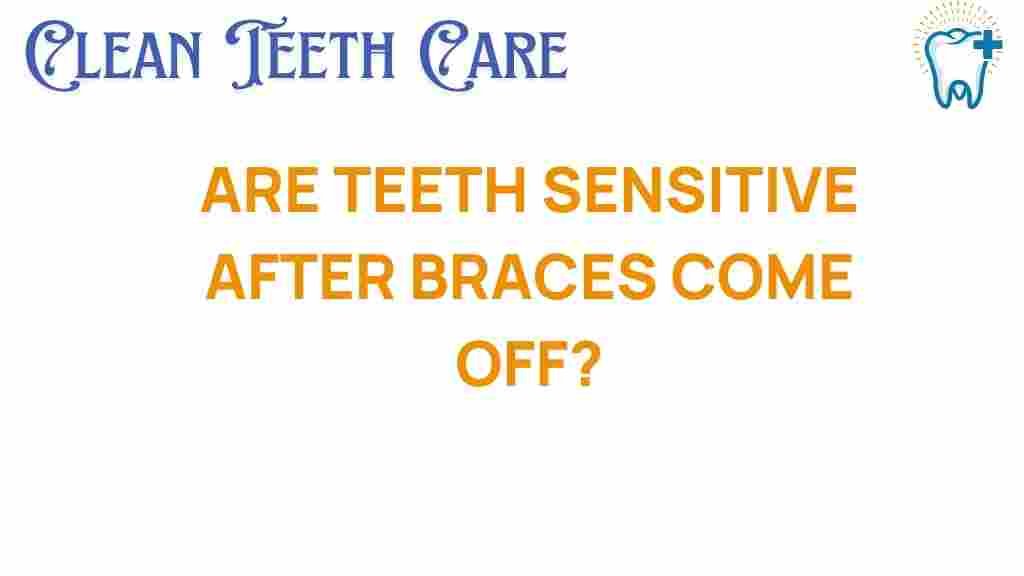Unveiling the Mystery: Are Teeth Sensitive After Braces Come Off?
Many individuals who have undergone orthodontic treatment often wonder about post-braces care, especially regarding teeth sensitivity after braces removal. The transition from braces to a beautiful, straight smile is an exciting milestone, but it can also come with its own set of challenges. In this article, we will explore the reasons behind teeth sensitivity, what to expect after braces removal, and how to maintain optimal dental health during this transition.
Understanding Teeth Sensitivity
Teeth sensitivity is a common issue that many people experience. It refers to the discomfort or pain felt in the teeth when exposed to certain stimuli, such as hot or cold temperatures, sweet or acidic foods, or even when brushing. Understanding teeth sensitivity is crucial, especially for patients who have just had their braces removed.
- Causes of Teeth Sensitivity:
- Worn enamel
- Exposed tooth roots
- Recent dental work or orthodontic adjustments
- Gum recession
After braces removal, many patients report an increase in sensitivity, which can be attributed to several factors related to orthodontics and post-treatment care.
What Happens During Braces Removal?
The braces removal process is straightforward but can have lasting effects on your dental health. Here’s a step-by-step breakdown of what happens:
- Preparation: Your orthodontist will first assess your teeth to ensure they are ready for removal.
- Removal of Brackets: The brackets are gently removed from each tooth using special tools.
- Cleaning: After removal, the adhesive used to bond the brackets is cleaned off your teeth.
- Retention: Your orthodontist may fit you with a retainer to maintain the new position of your teeth.
Although the process is quick, the removal of braces can sometimes lead to temporary teeth sensitivity.
Teeth Sensitivity After Braces Removal
So, are teeth sensitive after braces come off? The answer is yes, many patients experience some level of sensitivity. Here are some reasons why:
- Adjustment Period: Your teeth have been under pressure for an extended period, and once the braces are removed, they may feel different, leading to sensitivity.
- Changes in Tooth Position: Teeth may shift slightly after braces removal, causing temporary discomfort.
- Cleaning and Polishing: The cleaning process after braces can expose tooth surfaces that were previously protected, leading to sensitivity.
Understanding this sensitivity is essential for managing your comfort and ensuring a smooth transition to life without braces.
Managing Teeth Sensitivity
Here are some effective strategies to manage teeth sensitivity after braces removal:
- Use Desensitizing Toothpaste: Switching to a desensitizing toothpaste can help alleviate discomfort.
- Practice Gentle Brushing: Use a soft-bristled toothbrush and avoid aggressive brushing techniques.
- Avoid Trigger Foods: Stay away from extremely hot, cold, or acidic foods until your sensitivity decreases.
- Stay Hydrated: Drinking water can help wash away food particles and keep your mouth clean.
By implementing these practices, you can mitigate discomfort and maintain your oral hygiene effectively.
Post-Braces Care: Keeping Your Dental Health in Check
Maintaining dental health after braces is crucial to ensure your smile remains beautiful. Here are some tips for post-braces care:
- Regular Dental Check-Ups: Schedule follow-up visits with your dentist to monitor your oral health.
- Retainer Usage: Wear your retainer as prescribed to keep your teeth from shifting back to their original position.
- Maintain Good Oral Hygiene: Brush at least twice a day and floss daily to prevent plaque buildup.
- Stay Informed: Learn about any potential issues that may arise post-braces and how to address them.
By following these guidelines, you can ensure your teeth remain healthy and beautiful after braces removal.
Common Concerns About Teeth Sensitivity
Many patients have common concerns regarding their experience with teeth sensitivity post-braces. Here are some frequently asked questions:
- How long will my teeth be sensitive after braces?
The sensitivity usually decreases within a few weeks, but this can vary from person to person. - Is it normal to feel pain when biting down?
Some discomfort is expected; however, if the pain persists, consult your orthodontist. - What should I do if the sensitivity worsens?
If sensitivity becomes unbearable, contact your orthodontist for advice.
Patient Experiences: Real Stories
Hearing from others who have gone through similar experiences can be reassuring. Here are a few patient experiences regarding teeth sensitivity after braces:
“After my braces were removed, I was surprised by how sensitive my teeth felt. It was a bit uncomfortable at first, but using a desensitizing toothpaste really helped!” – Sarah, 24
“I experienced a lot of sensitivity for a few weeks, especially when drinking cold beverages. I made sure to follow my orthodontist’s post-braces care tips, and that made a big difference.” – Jason, 30
These stories highlight the importance of managing expectations and understanding that sensitivity is a common part of the transition.
When to Seek Professional Help
While some sensitivity is normal, there are certain situations where you should seek professional help:
- If the pain persists beyond a few weeks.
- If you notice swelling or signs of infection.
- If you experience severe pain when biting down.
Consulting your orthodontist or dentist ensures that any underlying issues are addressed promptly.
Conclusion
In conclusion, teeth sensitivity after braces removal is a common concern that many patients face. Understanding the reasons behind this sensitivity and knowing how to manage it through proper post-braces care is essential for maintaining long-term dental health. By following your orthodontist’s recommendations, using desensitizing products, and practicing good oral hygiene, you can navigate this transition with confidence. If you have any ongoing concerns, don’t hesitate to contact your dental professional for guidance.
For more information on orthodontics and maintaining your dental health, visit this resource.
Remember, a beautiful smile is worth the care it requires!
This article is in the category Conditions and created by CleanTeethCare Team
